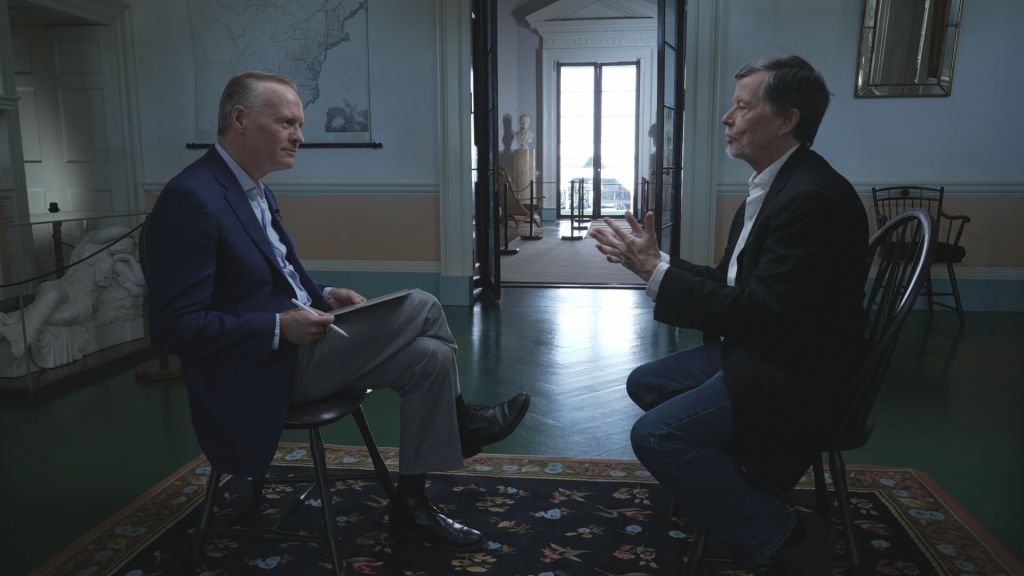As Congress considers legislation that would strip federal funding from public media, filmmaker Ken Burns is speaking out on the prospect, calling it “foolhardy” and telling CBS News‘ John Dickerson, “I couldn’t do any of the films I’ve done without them being on PBS.”
Burns has been a prominent voice defending public media, but he also will be a major figure in talking about the American Revolution, as the U.S. prepares to celebrate the 250th anniversary of the signing of the Declaration of Independence next year.
PBS has slated Burns’ six-part The American Revolution for this November. The project, which Burns produced and directed with Sarah Botstein and David Schmidt, will include a companion book from Geoffrey Ward, its primary author who wrote the documentary series.
As President Donald Trump has issued executive orders directing federal agencies to focus on the 250th anniversary, and his Big, Beautiful Bill provides funding for it, Burns has offered a more comprehensive and complicated perspective of American history. In his interview with Dickerson, which will air Sunday on Face the Nation and was taped at Thomas Jefferson’s Monticello, Burns talked about the need to present history as more than slogans.
Dickerson asked Burns, “President Trump has issued an executive action in which he says basically, history has gotten out of balance. [He] says that the American government either funds it through museums or national parks, and he said instead that this federal role in history should instead focus on the greatness of the achievements and the progress of the American people. So President Trump thinks there’s an imbalance in the way we talk about history. How do you see that?”
Burns said, “I don’t see the imbalance. I think we need to celebrate the greatness of the American people. The greatness of the American people comes from telling these complicated stories, and that’s a good story. A good story is a good story. That’s what you’re looking for. You don’t want to just say it otherwise, it’s just sort of slogans that are- that are put up on the wall. We want to feel that we know who Thomas Jefferson is. We need to understand the internal struggles that Abraham Lincoln had. We have to understand what was going through Rosa Parks’ mind when she, you know, refused to give up her seat on the bus. This, in no way takes away from the glory, it just makes the story fuller and richer and- and permits purchase for everyone you want a history to be complicated because it gives everybody a chance to own or have access to it. There is my door where I’m going through.”
Burns added, “There’s a wonderful scholar, Maggie Blackhawk in our film, who says, after our scene on the Declaration of Independence, that it’s deeply significant to people at the margins. That these words that do not include them. They do not include women, they do not include the poor, they do not include any enslaved or free African Americans. They do not include Native Americans. But the words themselves are so inspirational that they begin to suggest a much larger and more, what we would say, kind of American polity. That a bunch of us all together, of different varieties, doing lots of different things and pursuing happiness, this idea of virtue and lifelong learning.”
The House of Representatives last month voted to strip the Corporation for Public Broadcasting of about $1.1 billion in federal funding that was already allocated for the next two fiscal years. Trump and Republicans have long attacked PBS and NPR, deeming them biased to the left. The Senate has yet to take up the legislation, part of a rescissions package that also slashes funding for foreign aid.
Asked about the threat to PBS, Burns said, “It is the Declaration of Independence applied to the communications world. It’s a bottom up. It’s the largest network in the country. There’s 330 stations. It mostly serves – and this is where the elimination of funding for the Corporation for Public Broadcasting is so short sighted – it mainly serves rural areas in which the PBS signal may be the only signal they get. They also have not only our good children’s and prime time stuff, they have classroom on the air continuing education, homeland security, crop reports, weather emergency information. That we’re going to take away?”
Burns continued, “This seems foolhardy and seems misguided, mainly because there is a perception among a handful of people that this is somehow a blue or a left wing thing, when this is the place that, for 32 years, gave William F. Buckley a show, right? … That show is, by the way, is still going on and moderated by a conservative. So I just think that maybe we’re throwing the baby out with the bath water.”
Burns has testified multiple times before congressional committees on the need for PBS funding.
He told Dickerson, “I couldn’t do any of the films I’ve done without them being on PBS. I could go into a streaming service or a premium cable tomorrow and get every one of the millions of dollars it took to do this in one pitch, but they wouldn’t give me 10 years. They want it in a year or a year and a half, and that’s the deal. I can’t do that. Same with Vietnam, same with the Civil War, same with Jazz, same with The National Parks, same with, you know, The Roosevelts. All of those- Country Music, all of those have taken time to incubate, and that has been under the system that has one foot tentatively in the marketplace and the other proudly out, kind of like the national parks or the Declaration of Independence applied to the landscape. These are really good American institutions that represent everybody from the bottom up, which is what it’s always about. That’s the essence of what Thomas Jefferson was talking about.”



